Need any help? Contact us:

Table of Contents

In the world of work these days, it’s entirely possible to accidentally render your business invisible, especially if you don’t have a website.
This is why eCommerce and online trade are incredibly important. Picture this: you are able to reach your potential customers (and maybe even partners) wherever and whenever you want; your goods are available 24/7; and you can conduct your business from one spot, whether it’s your home or office.
How do you achieve all that? Simple: just pick an eCommerce website builder and create your online store. Here is a breakdown of the top 5 to help you choose which one works best for your business.
Shopify
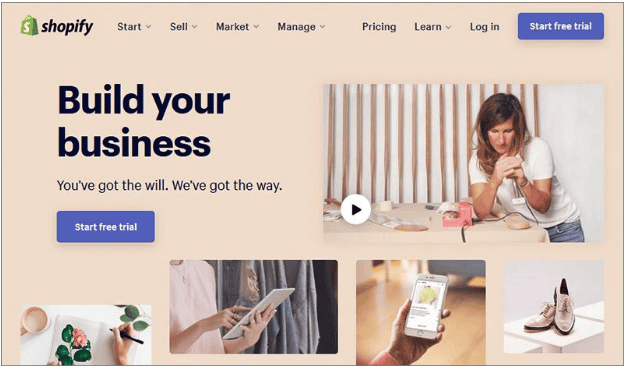
Shopify is one of the giants in the web building world. But don’t let this fact scare you away. Shopify is actually very easy to use, which makes it suitable for beginners. Additionally, it is fast and feature-rich. This web builder is ideal for someone who wants an affordable option with lots of templates and customisation options. It’s also suitable for people who want to expand their client base and sell through different channels, including social media platforms with the added benefit of top Shopify Shipping Apps.
Many sellers move their store from Magento to Shopify due to this reason.
Even if you are an experienced user, Shopify comes with loads of helpful apps and add-ons (both free and paid ones). These can be especially useful if you’re figuring out how to generate sales on Shopify. It also offers high security for payments and your customers’ personal data.
Pros:
- Simple interface, intuitive and user-friendly;
- Various stylish templates;
- Fast and smooth operation;
- Great online support;
- Allows for multiple sales channels;
- Secure payments;
- Flexible in terms of customisation;
- Works great for both small and larger-scale businesses;
- Tons of useful add-ons (for instance, email marketing tools).
Cons:
- The SEO features might not be enough for some users;
- Not ideal for multilingual stores (the functionality is limited and the price for this feature is quite high);
- Transaction commission on your sales;
- The add-ons and extra features are quite costly and may be too much for some users.
- For those already on a different platform and considering a switch, collaborating with a shopify migration agency can ensure a seamless transition.
Wix eCommerce
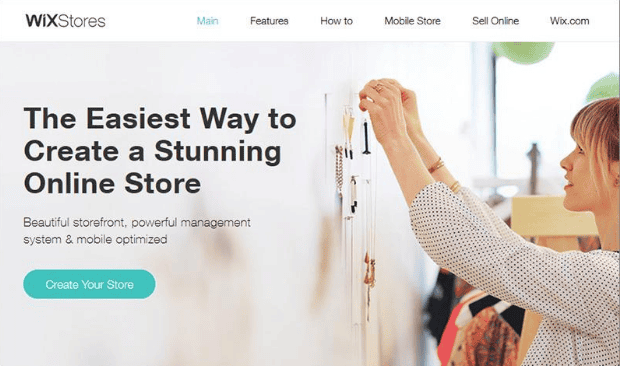
What makes Wix stand out from the competitors is the creative freedom that it offers. Plus, the combination of impressive functionality and an extremely simple interface can also win you over. This is what makes Wix suitable for pretty much any user and any business.
But the list of this web builder’s advantages doesn’t end there. Wix comes accompanied with powerful eCommerce tools. For instance, it allows you to recover abandoned carts and get back to the customers who left some products in the checkout. Additionally, Wix works with multiple languages, which means you can reach potential customers all across the world.
Pros:
- Good value for money;
- No sales commission;
- Lots of creative options;
- Very user-friendly;
- Supports multilingual websites;
- Includes advanced and effective eCommerce tools;
- Various templates and designs to fit anyone’s taste.
Cons:
- Customer support might not be very responsive;
- Doesn’t offer social media integration.
BigCommerce
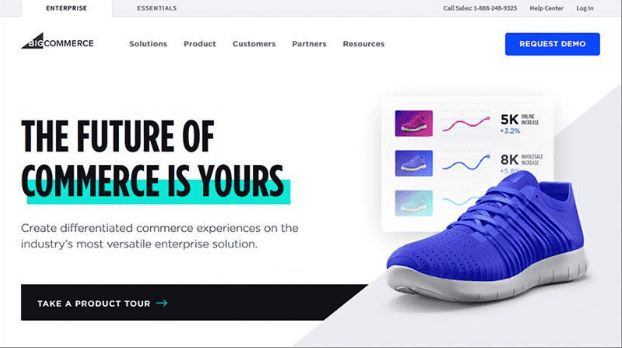
If you are looking for an all-in-one eCommerce website builder, then you might be interested in BigCommerce. It has everything: stylish templates; many customisations options; security firewalls; SEO features; and, of course, essential eCommerce tools.
This web builder would be ideal for business owners who really want to go big and expand their business channels. It’s also great for someone who wants to have total control over their website. BigCommerce offers analytics, SEO, and even marketing tools, which means you can handle all of these aspects on your own.
Pros:
- Tons of extra features;
- Allows for social media integration;
- Stylish templates;
- No transaction fees;
- Great SEO features;
- Responsive and rather easy to use.
Cons:
- Annual sales are limited (you might need to upgrade your plan);
- No mobile app, so you can’t manage your website on the go;
- Not the cheapest option (even though the plans are quite feature-rich).
Volusion
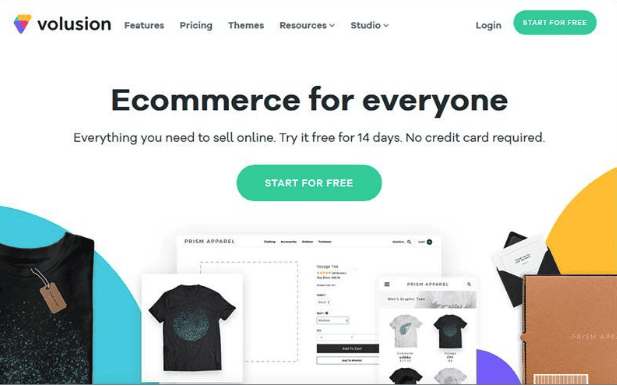
There are many things Volusion has to offer, and they are very likely to win you over in a heartbeat. For instance, Volusion is extremely easy to use. Basically, once you have signed up, you already have an operating website. All you have to do then is add your goods, change the design, and adjust the settings if needed. It also supports a mobile app, which means you can work on your website using a cell phone or a tablet.
Another thing that makes Volusion special is the support the platform offers to its users. The help centre works 24/7, and there are multiple ways to reach Volusion representatives. Plus, there are many tutorials available, which makes Volusion perfect for beginners.
Pros:
- Extremely easy to use;
- Excellent support;
- Loads of great templates, all of which are optimised for mobile users too;
- Social media integration;
- Built-in SEO and marketing tools;
- Multiple payment options;
- Built-in inventory tools;
- Secure payments.
Cons:
- Not suitable for selling digital products;
- Pricy extras and add-ons;
- Slower than many other web builders.
Weebly eCommerce
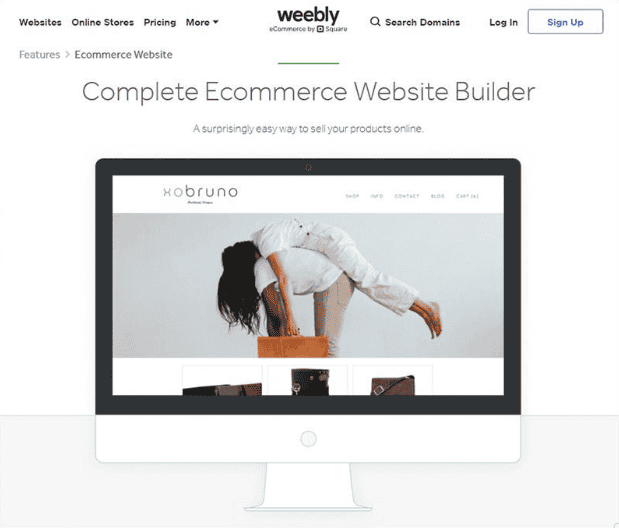
Weebly is another web builder that deserves your attention. Thanks to its simple drag-and-drop design and a set of eCommerce tools, Weebly is suitable for pretty much any user. It supports both digital and physical products, has mobile-friendly templates, and even offers a mobile app, which will allow you to build your website on the go.
Weebly is also a great option for someone who is just starting and has a tight budget. The plans are rather affordable, and there’s even a free option available. Of course, it will be more limited functionality-wise, but you can test Weebly for free to see whether it works for you or not. Plus, Weebly App Centre offers a bunch of extra features (user ratings, for example), which means you can always improve your website and step your game up.
Pros:
- Intuitive and easy to use;
- Mobile-friendly (both template design and web building);
- Affordable pricing and a free plan;
- Offers a built-in tax and shipping calculator;
- Multiple payment options;
- Inventory tools.
Cons:
- Some of the plans have transaction fees;
- No website back-up;
- Inability to undo the edits when building your website;
- Not as flexible design-wise and other web builders.
Which One Should You Choose?
In my opinion, although all of these 5 ecommerce platforms are superb, Wix gives you just that extra bit of zing to fast-track your success. This platform delivers the most scalable, affordable, and power packed user experience, without bogging you down with complex settings and feature-overload. The ecommerce landscape is evolving rapidly, and Wix has shown that it can stay updated, and hence, keep its users empowered. The App Store keeps on getting updated with all-new ecommerce tools, which means you will always have a solution to even the most niche requirements.
This article does not constitute legal advice.
The opinions expressed in the column above represent the author’s own.
Start managing your legal needs with Zegal today
RELATED READING: Essential Legal Considerations For Online Marketplaces




